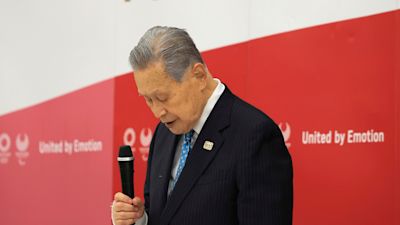Tokyo Olympics president resigns following outrage over sexist comments

The president of the Tokyo Olympic organising committee has resigned after making sexist comments in a meeting.
Yoshiro Mori’s departure follows over a week of non-stop criticism about remarks he made earlier this month.
In a meeting of the Japanese Olympic Committee, the 83-year-old said: “Women are very competitive. When one of them raises her hand, they probably think they have to say something, too. And then everyone says something.”
His comment came when he was asked about the presence of few women on the board of the Japanese Olympic Committee.
He added: “If we increase the number of female board embers, we have to make sure their speaking time is restricted somewhat, they have difficulty finishing, which is annoying.
“We have about seven women at the organising committee but everyone understands their place.”
He initially gave a grudging apology a few days after his opinions were reported but declined to resign. His refusal sparked relentless pressure from television pundits, sponsors, and an online petition, which drew 150,000 signatures.
“As of today I will resign from the president’s position," Yoshiro Mori said to open an executive board on Friday.
"My inappropriate comments have caused a lot of chaos.”
He repeated several times that he regretted the remarks, adding that he had “no intention of neglecting women.”
Early reports said Mori had picked 84-year-old Saburo Kawabuchi to replace him. Kawabuchi is the former president of the governing body of Japanese soccer and a former player himself. He played for Japan in the 1964 Olympics.
These reports raised the issue of why a woman was not appointed. After all, Mori's comments triggered debates about gender inequality in Japan and the absence of women in boardrooms, politics, and sports governance. Women are also largely absence in leadership roles at the Olympic organising committee.
Kawabuchi indicated on Thursday he had been contacted by Mori and would accept the job if offered. However, he later said he might not be the appropriate choice and seemed to be withdrawing.
Japanese media immediately pointed out there were three qualified women - all athletes and former Olympians and at least a generation younger - who could fill the job.
Kaori Yamaguchi won a bronze medal in the 1988 Olympics in judo. Mikako Kotani won two bronze medals in the 1988 Olympics in synchronized swimming. Finally, Naoko Takahashi was a gold medalist in the marathon in the 2000 Olympics.
Seiko Hashimoto, the current Olympic minister and a former Olympian, has also been mentioned as a candidate.
Mori’s remarks have highlighted how far Japan lags behind other prosperous countries in advancing women in politics or the boardrooms. Japan stands 121st out of 153 in the World Economic Forum’s gender equality rankings.
Koichi Nakano, a political scientist at Sophia University in Tokyo, described Japan as a country still run “by a club of old men.” Despite this, he said Mori's resignation could be a watershed.
“Social norms are changing,” he said.
“A clear majority of the Japanese found Mori’s comments unacceptable, so the problem is more to do with the lack of representation of women in leadership positions.
"This sorry episode may have the effect of strengthening the call for greater gender equality and diversity in the halls of power.”
Several hundred Olympic volunteers said they were withdrawing following Mori's remarks. Most decision makers including Japanese Prime Minister Yoshihide Suga stopped short of this and simply condemned his remarks.
A comment a few days ago from Toyota Motor Corporation President Akio Toyoda seemed to move the needle.
As a sponsor, Toyota pays about $1 billion every four-year cycle to the International Olympic Committee. The company seldom speaks out on politics, but made the decision to comment on Mori's words.
“The comment is different from our values, and we find it regrettable.” Toyoda said.
It’s not clear whether Mori's resignation will clear the air and return the focus to exactly how Tokyo can hold the Olympics in just over five months in the midst of a pandemic.
The Olympics are to open on July 23, with 11,000 athletes and 4,400 more in the Paralympic a month later. About 80% in recent polls in Japan say they want the Olympics canceled or postponed. Clear support for the event stood at about 15%.